Disease X - 20 Times Worse Than Covid 19? - Interview with Dr. Peter A. McCullough
Kla.TV:
Dr. Peter McCullough, it's great to see you again. Thank you so much for this interview.
McCullough:
Thank you.
Kla.TV:
So, headline from the World Economic Forum website, Davos Annual Meeting 24 preparing for Disease X. This is something that appears to be led by our favorite Tedros Ghebreyesus. They're talking about a new disease. They're really hyping it up. It seems not only is the WEF involved, apparently, according to my research, the CFR also had a Conference where they discussed this earlier in the year. What are they trying to do with this Disease X? What's going on here? And what are we being prepared for?
McCollough:
Disease X, as a term, has been in the medical literature, going back to some original publications by the WHO in 2017. So, most discussions are based on the fact that disease X is not a real disease. It's a theoretical threat. Disease X at the World Economic Forum, the World Health Organization, and by researchers, indicate that disease X is going to be a product of gain-of-function research, just like the SARS-CoV-2 virus that would come out of a biosecurity lab, some type of breach or some type of failure of securing the organism. They're talking about gain-of-function research out in the open now, making a virus or a bacteria or fungi more infectious and more invasive and lethal.
Kla.TV:
Yeah. How do they come up with this 20X figure? And why would it be so much more extreme this time?
McCullough:
Good question. If they don't know what the organism is, how do they know it's 20 times more lethal? These are the things we can't explain. What is the World Economic Forum doing talking about gain-of-function research? Shouldn't they be worried about securities and interest rates and economic issues? Why are they dabbling in the field of biological threats and then countermeasures? It's because it's big business now. We don't hear about nuclear weaponry or defense systems. We hear all the time about biolabs making biological threats to injure human populations, and then the countermeasures. And there's so much money in these vaccines, monoclonal antibodies, and therapeutics. That's the reason why we're hearing about it, the public is scared to death. The entire world has gotten sick with COVID-19. They're just coming out of it, four years of misery. Now another threat on the horizon, man-made.
Kla.TV:
So you could say this is just stoking up the fear. This is huge fear-mongering.
McCullough:
It's huge fear-mongering, but just like with... If you look at COVID, I wasn't paying attention to any of these developments. Most people weren't. But in 2012, DARPA, the research unit of the military, had on their website the ADEPT P3 program. They were developing messenger RNA to end pandemics, they claimed, in 60 days. That was in 2012, long before Operation Warp Speed. The Johns Hopkins Bloomberg School of Public Health, in 2017, held a widely published seminar called the SPARS pandemic. And it was a coronavirus pandemic planning meeting. And they published two peer-reviewed papers from this. And then in 2019, the Event 201 was held in the fall. The Chinese CDC director comes over, Avril Haines, our current director of national intelligence, state senators were there and they were all planning for a coronavirus pandemic before the pandemic was announced. Now, none of these events I paid attention to. None of them. I didn't know about any of them in real time. So when we were told a COVID-19 pandemic was starting in January 2020, I didn't realize that in total there had been 36 pandemic preparedness planning meetings. Twenty-five of them generated documents. Six were filmed. And they're all laid out in the book by Peter and Ginger Breggin called COVID-19 and the Global Predators. There is a historical timeline for the planning of the COVID-19 pandemic and the response to it. We even have the PREP Act written by Congress and HHS in 2005 planning for pandemics and what's called countermeasures, the responses. So disease X is not new in terms of planning. My point is, listen, I wasn't paying attention to all this pre-messaging on the COVID-19 pandemic. And so I personally was caught flat-footed as a citizen, as a doctor. And I had to jump into action way after the fact. Now with disease X, we are proactive.
Kla.TV:
How would you have known? I mean, some people did know, for example, not many. Later, I'm going to mention a German guy who somehow was keyed into all this beforehand. But like if they run an event like Event 201 sponsored by Gates, I mean, does this not get around in the literature? Are white papers not written? Who's invited? Who's not? Why wouldn't a good, solid doctor like yourself somehow be made aware of this stuff?
McCullough:
It was all out there. You can go on the U.S. military DARPA website. From 2012, they announced this messenger RNA program. You know, the Johns Hopkins website published an over 80-page report from this SPARS pandemic. And then once the pandemic hit, they actually put out two peer-reviewed papers in the medical literature saying, we called it. So, you know, this is wide-open messaging. We know vaccine promoter Peter Hotez, he had National Institute of Health grants with the Chinese, Fudan University, in 2016 and 2017. And guess what? For coronavirus biodefense projects. So all of this was going on. I think the two biggest papers I missed, and they're very, very important, were published by first author, Vineet Menachery. Senior author was Ralph Baric. They appeared 2015, Nature and Medicine, in 2016 in the Proceedings of the National Academy of Sciences. They announced creation of what they called a SARS-like Wuhan Institute of Virology 1 virus. They actually declared that they had created the COVID-19 virus, the primordial prototypical chimeric virus, and they published it in the peer-reviewed literature. They said it was, gain-of-function research, and it was started before the moratorium on federal funding. They said it was done in a biosecurity level three lab in Wuhan, China. They thank Peter Daszak at the EcoHealth Alliance, who made hundreds of trips between the United States and the Wuhan lab to shuttle the plans over to the Chinese. And they thank Dr. Xing Jingli, the lead researcher at Wuhan, the bat lady, for carrying out the experiments. So it's all in the open. COVID-19 is a U.S.-Chinese creation. Baric and his team will not release the genetic code from those papers because almost certainly it matches or closely matches the COVID-19 virus that came out of Wuhan.
Kla.TV:
And I think we can say, you know, in case there's any lingering doubt, the icing on the cake, which you mentioned in a recent interview, is three days after the announcement in America officially of COVID-19, what was it? Which vaccine company?
McCullough:
It was Moderna.
Kla.TV:
It was Moderna. Moderna comes out and they have the solution. I mean, thats three days after it arrives. Hey guys, it happened.
McCullough:
Right. In the peer-reviewed literature, Stéphane Bancel, the CEO of Moderna, in the peer-reviewed literature, there are papers summarizing at least three Moderna patents that would be applicable to COVID-19 vaccines. They had a material transfer agreement with the University of North Carolina, Chapel Hill, and Dr Ralph Baric, before the pandemic, probably transferring the genetic code from the University of North Carolina to Chapel Hill. And then Bancel himself, before he joins Moderna, he's leading BioMérieux. And guess what BioMérieux, the French company is doing? They're building the annex, the biosecurity annex at the Wuhan Institute of Virology. So Bancel knows the lab very well. He's been working with the Chinese. He moves over to this position in Moderna, and then he begins working on the COVID-19 vaccine. Now, Moderna thinks that they have a claim to the vaccine and they got the patent first because they're suing Pfizer over Pfizer copying the COVID-19 messenger RNA vaccine. So it all fits together.
Kla.TV:
Incredible. I just saw, well, this is an old post, but it was a Twitter post by Trump's daughter. Ivanka, is it Ivanka? Anyway, Trump's daughter, and she's posting, listen, calm down, everyone. We have a solution to this. It came out in 2020. And she talks about the invention of the Moderna and the Moderna coming out. I mean, just on the heels of them announcing that COVID was here.
So in light of all of this information about what we know before COVID-19, the 26 events, everything, focusing now on this, 20 times more lethal disease X, can we sort of be pretty sure that the same drama is being produced right now?
McCullough:
I think we can. There are actually already peer-reviewed papers on disease X and what's the next pandemic. Most experts believe it's going to be another viral upper respiratory tract illness. That's the only way to make the whole world sick. It may be another RNA virus closely related to COVID. Or it could be, you know, others. There's RSV. That's another, you know, modified form of RSV that could get everybody sick. But it's probably going to be a virus. And so we're advising now people take measures right now to be ready.
Kla.TV:
Okay. I want to mention a German doctor and researcher. His name is Heiko Schoening. You're familiar with the name?
McCullough:
Yes. Okay.
Kla.TV:
So he predicted in December 2018 that COVID was coming our way. According to his quote, I said that a panic was heading our way in 2020, that the company, Emergent Biosolutions in Fuad al-Hebri will be involved. That's exactly how it happened. That was central. And now it is going to be National Resilience, name of a company. It's going to be Christopher Darby. And he mentioned some other names like Michael McManus. But he predicts that it's going to be a bacteria-based pandemic with a bacteria resistant to antibiotics. What about that possibility?
Dr McCullough:
It's possible. Although sometimes combination antibiotics prevail. We heard about the Chinese pneumonia. Turned out to be a macrolide resistant mycoplasma pneumonia, but it was easily treated with doxycycline. So that never really panned out. Even bacterial threats like anthrax can easily be treated with antibiotics. So I think a bacterial superbug is going to be hard to devise and then get it to spread. Again, the spread by contact, that can be quickly stopped by just not having contact. So again, we would have to talk about a respiratory bacteria that's spread in that manner. I think it's less likely. I think the virus is more likely. But this doctor is paying attention. Emergent BioSolutions is a biodefense contractor. They're outside of Baltimore. Turns out they made the AstraZeneca and the Janssen vaccines, the adenoviral vaccines. Isn't it interesting? Two companies have the same similar vaccine. It's made by the same biodefense company. And Resilience is one of the major biodefense companies for Moderna. So what we've learned is the pharmaceutical companies are not making the products themselves. They're made by basically biodefense contractors that largely get their money from governments.
Kla.TV:
Yes. Well, what about the possibility that this next pandemic will be the same as the last in the sense that whatever they create in the lab isn't going to be one-tenth as dangerous as they're purporting it to be. And it'll be something that whatever solution they offer or anybody offers, maybe your best bet is just to live a healthy life and stay away from the suggested solutions.
Dr McCullough:
It's true. The survival of the fittest. If there's a time to lose weight, get fit, have the best health possible. Now is the time because we're constantly bombarded with, as you said, fear mongering, these threatening messages regarding various infectious disease threats. Almost certainly we're looking at a respiratory illness. It just, nothing else is going to spread. You know, we would never have Ebola spread all over the world because it's spread by contact. So it's quickly snuffed out. Even monkey pox. Remember there was a national monkey pox. It took a tremendous amount of physical contact. And so it largely was down to very intense sexual contact between gay men and bisexual men that largely drove the spread of it. So these illnesses, you know, there was a man, the CDC chronicled who came from Africa. He actually had the real monkey pox from the animal. And he traveled to Atlanta. He saw his friends. He traveled to Dallas. He was all over the place. He didn't spread it to a single person. And finally, somebody said that's an unusual rash. And they referred him, you know, to the medical center and he received appropriately received Ticoverimath, the treatment for it. So I was on national TV back with this monkey pox scare. I said, listen, this is not going to spread all over like COVID-19, you know, even Spanish flu, which had a huge mortality rate, about 25% of the world got Spanish flu, Spanish flu, the virus itself didn't cause the demise. It was actually a secondary staphylococcus pneumonia. So it's, it's possible that the next threat itself, it won't be directly lethal, but the secondary illness could. And again, now we have antibiotics. People shouldn't die of influenza. If they're properly treated early, we have both antivirals and then we can manage the back end secondary bacterial infection.
Kla.TV:
Okay. To wrap up - one question: In light of the fact that a large part of pandemic preparedness, involves vaccines, shouldn't one important lesson we learned from the COVID debacle be that the pandemic preparedness agenda presents more of a threat to humanity than the pandemics themselves?
Dr McCullough:
It is true with COVID-19 that the vaccines were far more dangerous than the illness. If you look at the US statistics, we're at about 1.2 million COVID deaths. Our CDC tells us about 10% of those are true adjudicated primary COVID-19 deaths. That's about 120,000. Estimates are, based on CDC declared, over 18,000 Americans dying with the vaccine, about 1,150 dying on the same day they take it, another 1,200 the next day. And with a underreporting factor of about 30, that puts us at about 550,000 Americans have died with the vaccine. It's roughly four to five times more lethal to take the shot than just have the infection. So vaccines should never be conceptualized as an answer to a pandemic. It's never worked before. It's been a disaster with COVID. The answer to pandemics is early treatment for the high-risk patients.
Kla.TV:
Very good. Dr. McCullough, thank you very much for this interview. Great to talk to you.
McCullough:
Thank you.
from dw / Dr. McCullough
Sources/Links:
www.mcculloughfnd.org
Some Articles on Disease X:
https://petermcculloughmd.substack.com/p/are-we-being-conditioned-for-another
https://petermcculloughmd.substack.com/p/preparing-for-disease-x
-
 16:30
16:30
klaTVEnglish
4 months agoDisease X - 20 Times Worse Than Covid 19? - Interview with Dr. Peter A. McCullough
901 -
 16:30
16:30
goldengel
4 months agoDisease X - 20 Times Worse Than Covid 19? - Interview with Dr. Peter A. McCullough
24 -
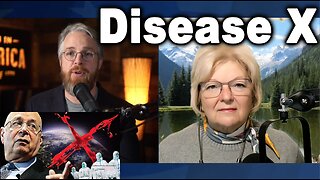 1:01:45
1:01:45
USAFrontlineDoctors
4 months agoDisease X and Their Desperate Attempt to Maintain Control w/ Dr. Tenpenny
1.33K10 -
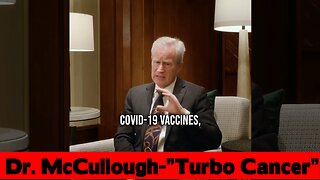 2:20
2:20
USAFrontlineDoctors
1 month agoDr. Peter McCullough Sounds the Alarm on COVID Vaccine-Induced “Turbo Cancer”
2.28K5 -
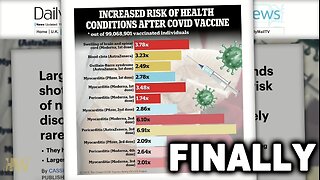 10:43
10:43
USAFrontlineDoctors
3 months agoINCREASED RISK OF HEALTH CONDITIONS AFTER COVID-19 VACCINES- YOU’RE KIDDING! WHO WOULD HAVE THOUGHT?
1.21K -
 6:43
6:43
USAFrontlineDoctors
3 months ago"770 Unique Symptoms" - Mind Blowing COVID Vax Data Uncovered
1.64K1 -
 1:07
1:07
USAFrontlineDoctors
3 months agoDr. Peter McCullough: There are Concerns About Vaccine Interactions? It's About Money, Not Good Health
9881 -
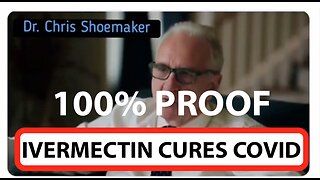 1:25
1:25
USAFrontlineDoctors
4 months agoDr. Chris Shoemaker – 100% PROOF that they KNEW Ivermectin Was the Answer to a Coronavirus Outbreak
1.45K4 -
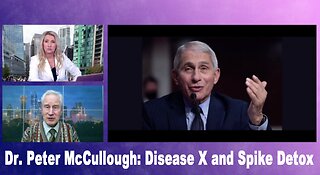 22:01
22:01
USAFrontlineDoctors
4 months agoBREAKING NEWS! Dr. Peter McCullough on Disease X and Spike Detox
1.29K4 -
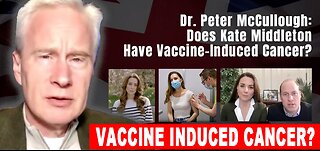 5:07
5:07
USAFrontlineDoctors
2 months agoDr. Peter McCullough: Does Kate Middleton Have Vaccine-Induced Cancer?
1.9K3